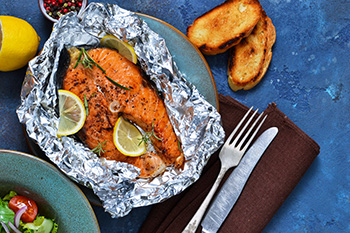It's easy to get answers about health and nutrition! Just send your question by email to [email protected] and Dr. Harlan will respond to selected questions of general interest. Answers will be posted in the Ask Dr. Gourmet newsletter (sign up now!) and archived in the Ask Dr. Gourmet section of the website.
Please note that the Ask Dr. Gourmet feature is restricted to questions regarding food and nutrition. Due to the many questions we receive, not all questions may be answered. For more specific questions about your individual health, please contact your doctor. About Timothy S. Harlan, MD, FACP, CCMS | Terms of Use | Privacy Policy
Ask Dr. Gourmet
Is aluminum foil safe to cook with?
I am concerned about the use of aluminum foil. I've heard that it is an unsafe metal and it leaks into foods when cooked with. What do you think, do you have any information on this metal?
Dr. Gourmet Says...

Aluminum will react with certain foods, especially those that are more acidic. In some cases this can result in a metallic flavor to your dish, or the food may become discolored.
As early as 1965 there was evidence showing a link between aluminum and Alzheimer's disease. The main source for concern were brain lesions in those who had died of Alzheimer's Disease. The abnormal brain tissue contained high levels of aluminum, and it was thought that excess intake of the metal might be the cause.
To date, however, there has not been convincing evidence to demonstrate that environmental exposure to aluminum causes the lesions or Alzheimer's disease. Likewise, even if there were a relationship between aluminum and disease, there are a number of other environmental sources for aluminum, including many foods, packaging, and even the water supply, as well as medications such as antacids.
I personally use aluminum pans and aluminum foil for cooking. There are a number of treatments employed that can help reduce the tendency of aluminum to react with foods. The most common is anodized aluminum, where the outer layer has been thickened and hardened through electrolysis to render the surface less reactive. This works well for most recipes and ingredients, but for recipes where there may be a reaction between the metal of the pan and the ingredients, I will use stainless steel or enamel lined cast iron.
Thanks for writing,
Timothy S. Harlan, MD, FACP
Dr. Gourmet
